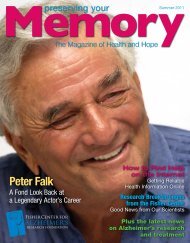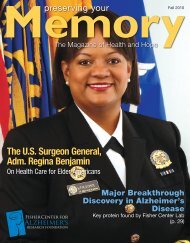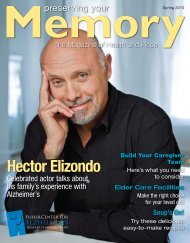Tracie Thoms - Fisher Center for Alzheimer's Research Foundation
Tracie Thoms - Fisher Center for Alzheimer's Research Foundation
Tracie Thoms - Fisher Center for Alzheimer's Research Foundation
Create successful ePaper yourself
Turn your PDF publications into a flip-book with our unique Google optimized e-Paper software.
order to engage the AD patient. At the<br />
same time, ask if there are topics you<br />
should avoid.<br />
Remain flexible. Given the everchanging<br />
nature of AD and its effect<br />
on people, you may find a new and different<br />
version of your loved one when<br />
you arrive <strong>for</strong> a visit. Expect the unexpected,<br />
since the patient may exhibit<br />
behaviors you’ve never seen be<strong>for</strong>e. If<br />
so, do your best to adapt to the realities<br />
of that day.<br />
Watch your phrasing. People struggling<br />
with memory loss are easily embarrassed<br />
by questions they have difficulty<br />
answering. Instead of putting<br />
your loved one on the spot with direct<br />
inquiries (“What did you do yesterday?”),<br />
consider making conversation<br />
in other ways. (“I took the kids to the<br />
baseball game yesterday. You used to<br />
take me when I was a kid; that was always<br />
such fun.”)<br />
Consider an activity. Visiting a loved<br />
one doesn’t always have to involve sitting<br />
around the house. The patient may<br />
enjoy a drive, a visit to a park, a trip to a<br />
museum or going to the movies.<br />
Keep things light. Visits are easier<br />
on everyone when the conversation and<br />
activities remain lighthearted. Laughing<br />
helps relieve tension. Playing music<br />
that the patient loves can help keep the<br />
mood light and fun <strong>for</strong> the patient.<br />
Simplify. Visits should be limited to<br />
just a few people at a time. Large groups<br />
can be overwhelming and limit the<br />
opportunity <strong>for</strong> real conversation and<br />
companionship.<br />
Clarify your departure plans.<br />
Be sure to prepare your loved one be<strong>for</strong>e<br />
you leave, even if it means the<br />
patient may protest, to minimize<br />
any sense of loss that may come with<br />
your departure. Enlist the help of the<br />
caregiver if necessary. If you already<br />
know the date and time of your next<br />
visit, communicate that clearly—<br />
write it down on the calendar the patient<br />
uses—so there’s a clear indication<br />
of when you’ll return <strong>for</strong> another<br />
visit. ■<br />
(continued from page 20)<br />
Color me with your divine<br />
perfection so I can find<br />
solace in your strong arms<br />
Lord, take my hand and lead me<br />
to peace I need to find,<br />
which will ease my troubled mind<br />
July 12, 2009<br />
I have been noticing some changes<br />
in my husband’s attitude and memory.<br />
What’s happening is life altering, hard<br />
to accept! I hope I AM WRONG! Tests<br />
will soon be done.<br />
Changes in You<br />
Something is amiss<br />
Things are just not right<br />
Something is happening,<br />
as you repeat some questions twice<br />
Sometimes you’re very snappy,<br />
when things don’t go your way.<br />
You huff and puff in anger,<br />
gradually driving every one away<br />
You say your mind feels blank<br />
at times, memories aren’t in place<br />
Unseeing eyes stare briefly<br />
into vacant space<br />
I think I know what’s happening,<br />
though I pray it isn’t true<br />
Alzheimer’s first set its deadly<br />
sights on me, and now is<br />
attacking you.<br />
Aug 31, 2009<br />
My husband, Richard, has been having<br />
memory problems. He stated he<br />
felt like there were blank spaces in his<br />
brain. He was having many of the same<br />
symptoms I had the previous year.<br />
His doctor ordered a PET scan. The<br />
results showed that he has Alzheimer’s.<br />
The news was overpowering!<br />
This poem is an attempt at some dry<br />
Irish humor:<br />
Remembering Together<br />
We try to remember<br />
the little things in daily life.<br />
If I <strong>for</strong>get something,<br />
I’ll ask him once or twice:<br />
Did I do this,<br />
where’d I put that,<br />
Oh I <strong>for</strong>got to tell you,<br />
the car has a flat.<br />
Patiently he tells me,<br />
the things I need to know.<br />
I try to do the same <strong>for</strong> him,<br />
especially when he’s watching a TV show.<br />
He’ll ask me who that person is,<br />
I’ll say that’s so-and-so<br />
He’s always been in show biz,<br />
or on that special show.<br />
I guess we’re kind of lucky<br />
there are two brains, instead of one<br />
We still can enjoy the little<br />
things, have some home-time fun<br />
So count your blessings every day<br />
as you travel life’s curving road<br />
You’ll never know until it’s your turn,<br />
to help carry a heavy load. ■<br />
summer 2010 www.ALZinfo.org 27






